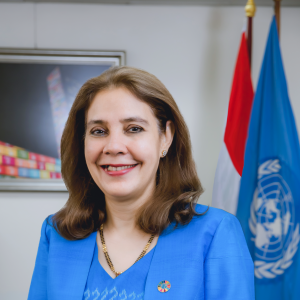We are gathered here today to fast-track Indonesia’s circular economy for electronics in line with the SDGs.
I would like to thank the government for taking this consultation forward in partnership with ITU.
Indonesia has shown great leadership on digital engagement by working towards global standards on digitization and developing digital infrastructure to reach the unreached.
Let me also thank the British Embassy for its support for today’s event and its commitment to the country digital transformation.
Today’s assessment of e-waste management is a ground-breaking step towards developing a national Extended Producer Responsibility (EPR) system.
This system will have positive knock-on effects not only nationwide but across ASEAN as well because Indonesia is among the first in the region to take this critical issue forward.
E-waste management within an EPR context is closely tied to the country’s forward-looking green economy agenda as it is the region’s largest generator of e-waste and the fourth largest in Asia with nearly 2,000 million kilograms of e-waste generated a year.
These include amenities we all use every day from air-conditioners to computers and from refrigerators to smartphones.
By developing a regulatory framework for disposal, collection and recycling, the government, in partnership with the UN and the private sector, will revolutionize e-waste management.
The EPR will bolster circularity, alleviate resource use and reduce GHGs in line with Indonesia’s NDCs.
Managing e-waste at municipal level is costly and a new policy framework would shift the onus to the producers and distributors of electronic goods to scale up e-waste management in the form of takeback, disposal and recycling.
Leveraging EPR also enables us to reduce environmental harms through improving product designs and upcycling valuable materials from e-waste.
This will benefit not only the environment but also people’s health as some of these materials are hazardous to both.
Importantly, this process also needs to involve altering mind-sets both among manufactures and consumers.
As users of electronics, we all generate such waste personally and can make a difference by disposing them responsibly.
Today’s consultation provides us with an excellent opportunity to share insights not only on EPR but also raise awareness of this critical issue.
Simultaneously, the UN, in partnership with government, will boost the evidence base on e-waste to model its scale, composition and disposal.
We are still a long way from concrete solutions but today we are taking a big step forward towards them.
The UN also stand ready to facilitate Indonesia’s digital transformation by bringing to bear higher-order technical assistance.
As part of this, ITU partners with the government to harness telecommunications technology to connect underserved regions in
Indonesia, enhance digital access through smart villages and smart island initiatives and identify financing to reach last-mile users.
Led by ITU and UNICEF through Giga, the partnership also seeks to connect every school to the internet to improve learning outcomes and leave no one behind.
At the same time, the Girls in ICT Day seeks to inspire girls and young women to pursue studies and careers in STEM fields.
Bringing young people to engage on issues of e-waste will also be critical as we need to leverage their tech savviness and drive for sustainable transformative outcomes.
I am looking forward to your insights on this and issues related to EPR during today’s discussions.
Terima Kasih



